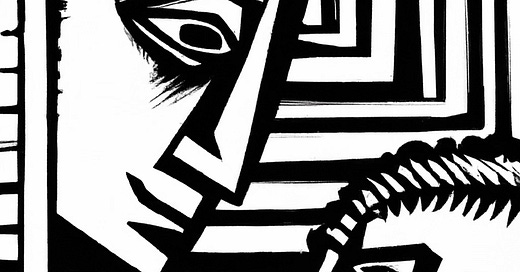The Lost Likeness
We cannot become like God through a single act of willfulness but rather through countless acts of willingness
When my son was three he began regularly waking up early in the morning and waddling into the living room in his footed pajamas. He would grab one of my books off the coffee table, nestle himself beside me on the couch, and “read” the book he was holding upside down.
To my surprise, I didn’t have to wake him up early; I didn’t have to ask him to come into the living room, and I didn’t even have to ask him to “read.” It just happened. He did it, because I did it.
Fred Rogers saw it all long ago, “from the time you were very little, you've had people who have smiled you into smiling, people who have talked you into talking, sung you into singing, loved you into loving.”
Here’s the question for us, who will show us the divine likeness? Who will be our model? our archetype?
The book of Genesis says that Adam and Eve were designed to fit that role. They were intended to be God’s representatives on earth, the founding family of the divine likeness, the starting point of humanity. Adam and Eve were gifted the immense privilege of flourishing into the divine life, cultivating spiritual fruit, while nurturing physical fruit at the same time — putting flesh on what God is like for future generations.
We glimpse their archetypal role in God’s instruction for them to be fruitful and multiply (Gen 1:28), which was not just a call for the expansion of human life, but rather the expansion of divine life in human bodies. In other words, this command doesn’t give Adam and Eve something new to do, something other than their telos, but rather it explains how their telos is realized.
Just as my son has automatically acquired my likeness, so the divine likeness was meant to be acquired automatically as human beings fruitfully multiplied over the earth — from one family to the next.
This automatic acquisition process, mimesis, is a fundamental aspect of human nature. It’s the unconscious process of making ourselves similar to someone else by relationship. It’s intuitive imitation. We see it most commonly in families — the closer the connection, the stronger the mimesis.
Adam and Eve were designed to be our original models for which the human family, beginning with Cain, then Able, and down to all succeeding generations, would naturally acquire the divine likeness.
But, of course, they lost track of that.
At some point after Adam and Eve were formed, they found themselves tempted by a serpent. Do you remember his offer? What did he say would happen if they ate from the Tree of Knowledge of Good and Evil?
“…when you eat from it your eyes will be opened, and you will be like God…”
Genesis 3:5
The human race’s first temptation was not an occasion to simply disobey one of God’s commands, as that’s commonly understood today, like a child sneaking a piece of candy before dinner. No, the serpent’s temptation strikes right at the very heart of their being. He offers Adam and Eve their telos, the very thing they were designed for, the thing they want more than anything else — to be like God.
This is what makes the garden lie so seductive. And it’s what we find when we dissect sin: we want the right thing in the wrong way.
In a moment of severe confusion and sadness, the snake convinced Adam and Eve that a life of becoming was beneath them. They didn’t need to be fruitful and multiply, they didn’t need to cultivate their telos. All they needed to do was take it. But, of course, they cannot take their telos like a piece of hanging fruit. They cannot grab for what’s meant to grow; they cannot reach for what’s meant to ripen.
Human beings cannot become like God through a single act of willfulness but rather through countless acts of willingness. Becoming like God is the work of a lifetime — it’s not the result of a single choice; it’s the sum of all our choices. It’s a journey.
The story of Adam and Eve is the story of you and me. We’re those same image bearers trying to consume what can only be cultivated, automatically imitating our first parents, repeating their same mistakes. Unfortunately, the process of becoming works both ways.
We’ve automatically acquired their unlikeness to God.




